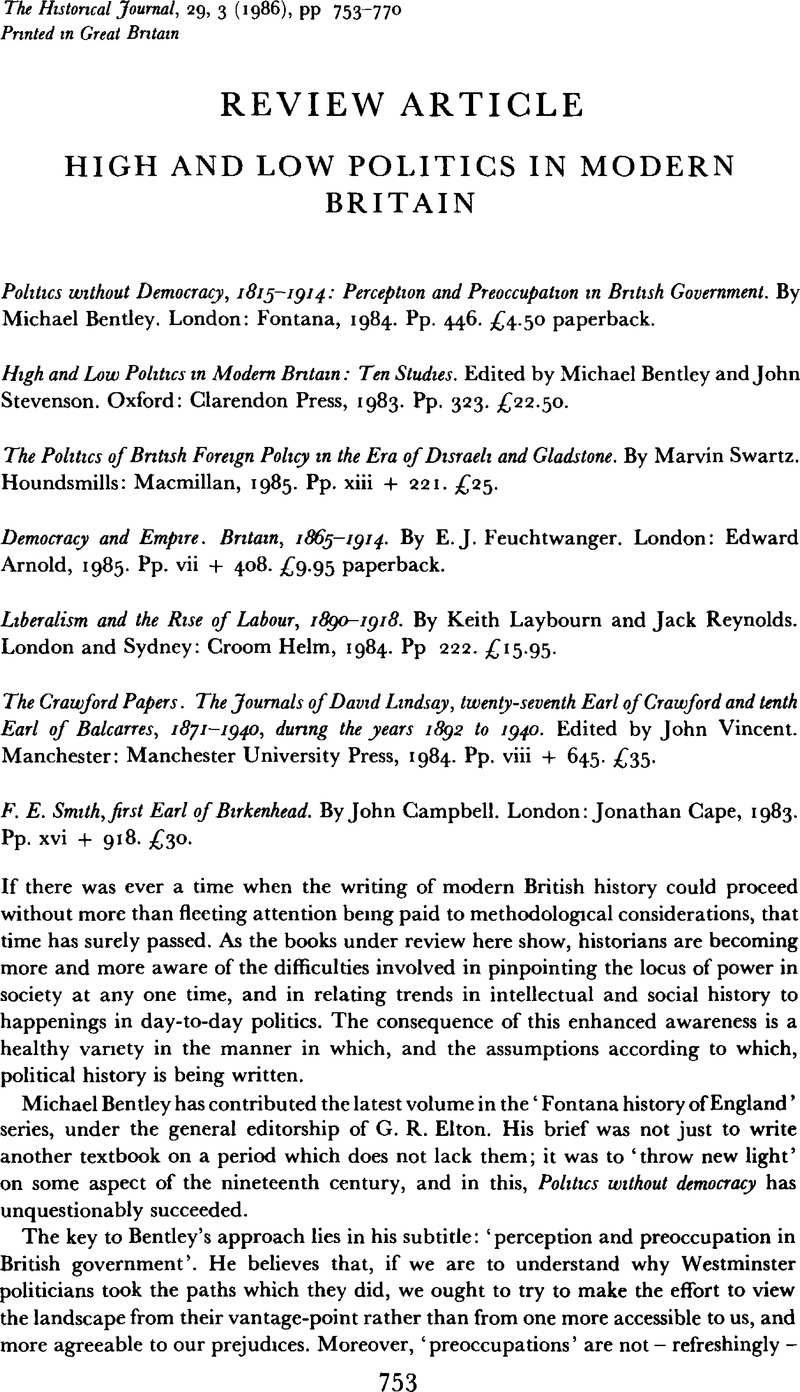No CrossRef data available.
Published online by Cambridge University Press: 11 February 2009

1 He distinguishes between the property and income taxes (p. 35); calls the Grenvillites whigs (38); presents Fitzwilliam as the lord lieutenant of the whole of Yorkshire (43); misdates Liverpool's death (61); places Graham in charge of the 1833 Irish Church Bill (89); misdates the granting of Durham's earldom (104); gives Roundell Palmer a peerage too soon (163; and omits this reference and one on page 147 from the index); underestimates Adullamite strength among ‘respected political leaders’, as a result of categorizing the 31-year-old Spencer as one (190); mis-dates the 1872 Licensing Act (199); describes Russell's rather active final ten years as his ‘last days’ in retirement (204); argues that the 1869 Irish Church Act ‘abolish[ed]’ the Anglican Church (208); misdates Derby's death by some months (208); misunderstands Gladstone's position on elementary education (211); suggests that the extra taxes originally imposed in the 1871 budget were withdrawn, whereas they were reallocated (214); misstates the problem of the Alabama (215) and the nature of the 1873 Irish University Bill (217); misdates Gladstone's 1875 retirement by a month (218); exaggerates Gladstone's tactical success in 1877 (227); chartsGoschen's progress from a 35-year-old ‘radical’ (185) to a 49-year-old ‘young Whig’ (232) and a 55-year-old 'centrist' (244); describes G. O. Trevelyanin 1882 as a ‘Whig’ (239); implies that the 1888 Local Government Act was a piece of Liberal legislation, and misdates the introduction of free education (261), suggests that the house of lords had not come under fire before 1888 (264); misspells Pigott (274); misdates Morley's entry into the cabinet (280); and suggests that Sandon was a high churchman (388).
2 One final and very considerable surprise is Bentley's throwaway line that the Poor Man's Guardian, the Black Dwarf and their like, had a ‘prodigious’ effect on the ‘proletarian mentality’ (P. 92).
3 Whose name is misspelt twice in the bibliography.
4 The most disturbing part of the book is the travesty of the account of the Conservatives' domestic policy after 1886. Salisbury's aim was, apparently, to create a ‘party of resistance’, and he achieved this after 1886 (p. 195). By ignoring all the other Conservative legislation (on housing, allotments and technical education, for example), Feuchtwanger is able to argue that ‘only two major reforms’ were passed during the 1886 government, and that these (county councils and free education) testifiedto ‘Conservative resistance’ – even though both proposals had ‘long been obvious planks in the Radical programme’ (p. 199). It was ‘fortunate’ that ‘Ireland remained so much in the forefront of the party battle’, because this meant that the Conservatives could survive without ‘legislat[ing] too much’ (pp. 196, 199). However, this sits oddly with the argument that it was ‘hardly likely that Ireland, an issue essentially extraneous to the persistent problems and divisions of British society, could for long crowd out other more pressing matters’ (p. 192). It followed, since home rule was not really a major issue, that the ‘Conservative hold on power was tenuous’ in 1886 (p. 192). Given these various assumptions, it is easy to see why Feuchtwanger considers it ‘remarkablf[e]’ that the Conservatives ‘continued to appeal to a sizeable part of the working-class electorate’ (p. 3).
5 Even his analysis of the home rule problem is devalued by a passage such as this: ‘These events [the parliamentary developments of the 1880s] are largely autonomous, independent of theevolution at the grass roots, and were the result of the interplay of parliamentary forces and personalities. Nevertheless it would be unreal to separate artificially the drama of high politics from either the slow-burning changes in the cities, the countryside, the factories and the boardrooms, or from the movement of ideas and perceptions’ (p. 146). This passage is odd, not only for the manifest internal contradiction, but because it leads into a chapter's discussion which does precisely that we are told would be ‘unreal’. Another instance of an apparently self-contradictory argument is the one on page 145, discussing the influence of the ‘labour aristocracy’.
6 For example, his reference to the ‘optimism’ of the Victorians (p. 1); to the‘healthy’ countrydwellers (8); or to the 1860s as seeing the beginning of the end of ‘splendidisolation’ (4). Other statements appear unnecessary or odd: that by 1914, parliament had still not been ‘taken over by the working classes’ (3), or that the ‘working classes’ deserted the Liberal party in large numbers in 1874 because Gladstone' ‘government; had not really changed their lot’ (82).
7 E.g. Bebbington, D. W., The nonconformist conscience: chapel and politics, 1870–1914 (London, 1982)Google Scholar; Freeden, M., The new Liberalism: an ideology of social reform (Oxford, 1978)Google Scholar; Wald, K. D., Crosses on the ballot: patterns of British voter alignment since 1885 (Princeton, 1983)CrossRefGoogle Scholar.
8 Hart, M., ‘The Liberals, the war, and the franchise’, English Historical Review, xcvii (1982), 820–32CrossRefGoogle Scholar; Tanner, D., ‘The parliamentary electoral system, the “fourth” Reform Act and the rise of Labour in England and Wales’, Bulletin of the Institute of Historical Research, LVI (1983), 205–19CrossRefGoogle Scholar.
9 It must be said, in fairness to the earlier biography, that it stands up tolerably well to Campbell's professional revisionism – as Campbell himself recognizes by frequent quotations from it.
10 Crawford himself regarded the Pensions Act as the ‘most corrupting bit of legislation passed in my time’ (p. 112).
11 Howarth, T. E. B., Prospect and reality: Great Britain 1945–1955 (London, 1985), pp. 88–9Google Scholar; Butler, D. and Stokes, D., Political change in Britian: forces shaping electoral choice (Harmondsworth, 1971) PP.159–70CrossRefGoogle Scholar.
12 See, e.g. Barnes, J. and Nicholson, D. (eds.), The Leo Amery diaries Volume I 1869–1929 (London, 1980), p. 356Google Scholar.
13 Birkenhead, Earl, Frederick Edwin earl of Birkenhead: the first phase (London, 1933), p. 12Google Scholar.
14 Leo Amery diaries, P. 504.